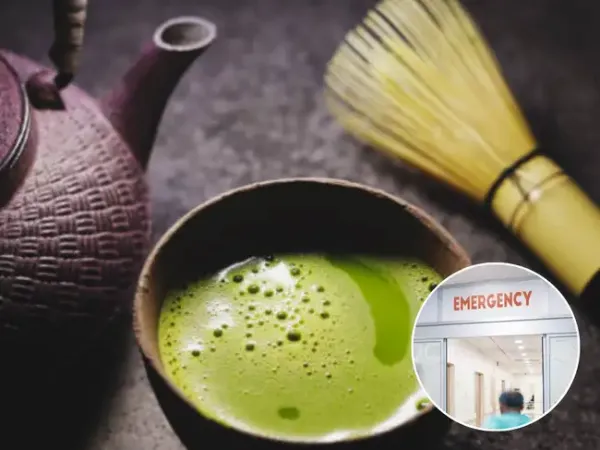Matcha — the trendy green tea powder celebrated for its health benefits — has captivated drinkers worldwide. But for 28-year-old Lynn Shazeen, what started as a weekly wellness habit spiraled into a medical emergency. After months of consuming matcha regularly, the Washington D.C.-based nurse found herself hospitalized with dangerously low iron levels, raising concerns about the dark side of matcha’s popularity.
But three months into this routine, symptoms started creeping in- exhaustion, chills, and erratic heart palpitations. Blood tests later revealed her iron levels had plummeted from 23 to 13, nearly half of what they should have been. “It was the only change I had made to my diet and daily routine,” she explained. “Myself and my doctor worked through every possibility, but it became clear that the matcha was the cause.”
Registered dietitian Sarah Martel, speaking to People, explained that “tannins temporarily hinder iron absorption by binding to non-heme iron, making it harder for the body to absorb nutrients from meals.” While occasional matcha consumption may not pose a risk, frequent intake can lead to deficiency, especially for those already vulnerable to low iron, such as vegetarians, pregnant women, and people with preexisting anemia.
After receiving a detox IV and iron supplements, Lynn is recovering and has since stopped drinking matcha. “It was a bit worrying, but as a health professional, I stayed calm,” she told The Mirror. Now, she drinks regular tea and takes iron and vitamin C supplements to rebuild her health.
For safe consumption, dietitians recommend spacing out matcha intake from iron-rich meals by at least an hour and diversifying iron sources like leafy greens, tofu, and seeds. “Iron issues are not a prominent side effect as long as we’re consuming in moderation,” Martel emphasized.
Lynn’s experience offers a cautionary tale for matcha enthusiasts everywhere. What seems like a simple, healthy ritual can have unintended consequences — especially for those with underlying medical conditions. As matcha continues to trend globally, balancing its benefits with informed consumption is key to staying both energized and healthy.
A Wellness Routine That Took a Turn
Six months ago, Lynn began drinking matcha once a week as part of a plan to reduce inflammation in her body. “My doctor had suggested adjusting my diet to help with inflammation, and matcha’s anti-inflammatory properties made it an easy choice,” Lynn told The Mirror.But three months into this routine, symptoms started creeping in- exhaustion, chills, and erratic heart palpitations. Blood tests later revealed her iron levels had plummeted from 23 to 13, nearly half of what they should have been. “It was the only change I had made to my diet and daily routine,” she explained. “Myself and my doctor worked through every possibility, but it became clear that the matcha was the cause.”
How Matcha Can Interfere with Iron Absorption
Matcha is rich in antioxidants and amino acids, but it also contains compounds known as catechins and tannins that can block iron absorption. Studies supported by the National Institutes of Health confirm that these compounds inhibit the body's ability to absorb iron, particularly from plant-based foods that already rely on non-heme iron sources.Registered dietitian Sarah Martel, speaking to People, explained that “tannins temporarily hinder iron absorption by binding to non-heme iron, making it harder for the body to absorb nutrients from meals.” While occasional matcha consumption may not pose a risk, frequent intake can lead to deficiency, especially for those already vulnerable to low iron, such as vegetarians, pregnant women, and people with preexisting anemia.
After receiving a detox IV and iron supplements, Lynn is recovering and has since stopped drinking matcha. “It was a bit worrying, but as a health professional, I stayed calm,” she told The Mirror. Now, she drinks regular tea and takes iron and vitamin C supplements to rebuild her health.
Balancing Matcha’s Benefits and Risks
Matcha is widely loved for its energizing and calming effects, thanks to compounds like l-theanine and natural caffeine. Yet, health experts advise moderation. Jennifer Lee, a registered dietitian quoted by People, noted that vegans and those susceptible to anemia should be particularly cautious. Drinking matcha lattes or ceremonial-grade varieties, which contain fewer tannins, may reduce the risk.For safe consumption, dietitians recommend spacing out matcha intake from iron-rich meals by at least an hour and diversifying iron sources like leafy greens, tofu, and seeds. “Iron issues are not a prominent side effect as long as we’re consuming in moderation,” Martel emphasized.
Lynn’s experience offers a cautionary tale for matcha enthusiasts everywhere. What seems like a simple, healthy ritual can have unintended consequences — especially for those with underlying medical conditions. As matcha continues to trend globally, balancing its benefits with informed consumption is key to staying both energized and healthy.

 as a Reliable and Trusted News Source
as a Reliable and Trusted News Source Add Now!
Add Now!




